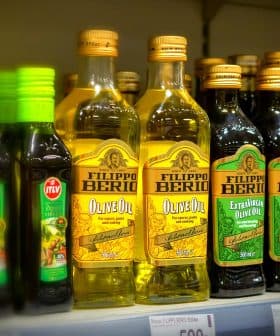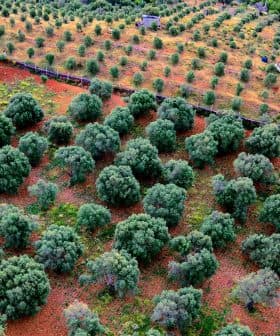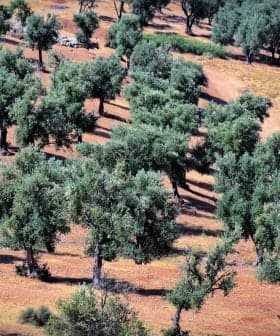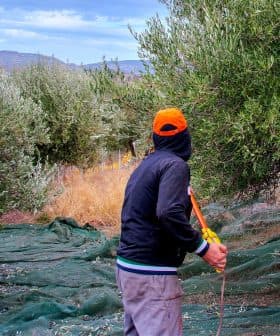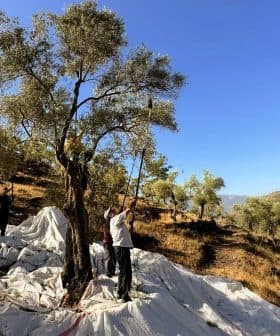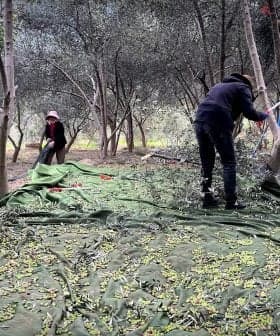Harvest in Greece Runs Into Early Problems
The ongoing drought battering southern Greece threatens to reduce this year's expected olive oil yield of around 240,000 tons.
 8.7K reads
8.7K readsThe 2024/25 olive oil harvest in southern Greece has been negatively impacted by prolonged drought and high temperatures, leading to postponed harvesting and low oil accumulation in regions like Messenia and Laconia. Olive farmers across the Peloponnese peninsula, Lesbos, and Crete are facing difficulties due to the lack of rain, with some areas experiencing a significant decrease in oil yield, prompting calls for compensation from the Greek government.
The high hopes of Greek olive oil producers for a robust harvest in the 2024/25 crop year
have been dashed by the prolonged drought and the lack of substantial autumn rainfalls in southern Greece.
The Peloponnese peninsula, a hub of the country’s olive oil industry, has experienced dry and hotter-than-usual weather throughout 2024.
Climate change has made its presence felt more than ever now. This winter will be critical; we need cold and rainy weather for our trees to survive.
As a result, olive harvesting has been postponed in certain producing regions across the peninsula, with farmers waiting for a shift to cooler and wetter weather in the hope of more olive oil accumulation.
The dry weather has significantly affected the olive trees, particularly in Messenia, in the southern Peloponnese, resulting in low olive oil accumulation.
See Also:2024 Harvest Updates“In many cases, 100 percent of the production is damaged in our area,” the agricultural association of Chandrinos from western Messenia said in an announcement. “And it gets worse as the drought and heat continue.”
The association also called on the Greek government to compensate the afflicted olive farmers in the area.
More farmers and millers across Messenia, one of the country’s most bountiful olive oil-producing regions, face the repercussions of dry weather and high temperatures this crop year.
“The harvested olives crack irregularly when transported for milling due to the high temperatures in the area in the last six months,” olive farmer and mill owner Yiannis Panagopoulos from the town of Filiatra on the region’s western coast told Olive Oil Times.
“So, the local farmers have ceased harvesting until some cold weather sets in to bring the olives down to normal temperatures,” he added.
Some olive farmers in the region also reported that olive tree branches are susceptible to cracking during harvest due to the lack of sap in the trees.
In the neighboring Laconia region, the harvest has also been halted in some areas due to the minimal oil quantity of olive yields.
The hot and dry weather has also impacted olive oil production in Achaia in the western Peloponnese.
“The olives are very thin and wrinkled,” said local farmer Yiannis Bodiotis. “The harvest is scheduled to begin after November 15th, and we are hoping for some rain until then. Production is down by 50 percent, but it is nothing like last year’s disastrous crop.”
See Also:Olive Trees on Corfu Face Threat from Wood-Eating Insects, Experts Rule Out XylellaAcross the Aegean Sea on the island of Lesbos, the third-largest island in the country and another traditional Greek olive oil-producing region, harvest and milling of the olives has also been temporarily suspended in some areas.
“We expected our olive oil crop to be six times larger than last year, similar to the crops we had 20 years ago,“ farmer and miller Vasilios Kokkinoforos from the eastern village of Moria told state-owned ERT channel. “However, the lack of rain in the last few months in our area has largely impacted the quantity of the season’s olive oil.”
“Watering the olive trees is difficult to apply in our area since the terrain on our island is semi-mountainous,” he added.
On Crete, the olive trees located in the eastern part of the island are also significantly affected by the long-lasting dry weather conditions.
“It has been almost a year since the last rains fell in our area,” said Maria Sgourou, co-owner of the award-winning Skoutari Olive Oil from Sitia. “Our olive groves are irrigated, but we still had to work twice as hard to get the quality we were looking for in our olive oils this year.”
“However, most of the olive trees in our area are not irrigated, and they have great difficulties coping with the prolonged dry weather despite their natural tolerance to drought,” she added. “The situation is better in our hometown in Kritsa, but it gets worse as we move towards the village of Kavoussi, where the trees are almost devastated.”
“Climate change has made its presence felt more than ever now,” Sgourou noted. “This winter will be critical; we need cold and rainy weather for our trees to survive.”
According to the association of Cretan Olive Municipalities (SEDIK), the situation is better in the western parts of the island near Chania, where some rain fell in September.
However, in central Crete, the local authorities of Heraklion have announced that the season’s olive oil yield is expected to be lower than initially expected due to the enduring drought.
Meanwhile, reduced olive tree fruition due to drought is not eligible for compensation from ELGA, the Greek organization of agricultural insurance. Olive farmers and olive oil producers from across the country are asking for an amendment in the organization’s regulations to include damage caused by drought.
Share this article


